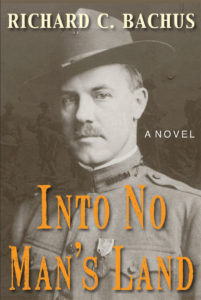 Published by Hellgate Press, 2017
Published by Hellgate Press, 2017
For more info, please visit:
https://www.hellgatepress.com/product/into-no-mans-landrichard-c-bachus-copy/
PROLOGUE
Dawn was a lethal time of day. The soldiers on both sides of No Man’s Land expected raids every morning. But the gas attacks, bursts of machinegun fire, the artillery barrages, and the sniper bullets had become so routinely random, that the expected hour was as good an opportunity to attack as any other time.
And so, Capt. Kurt Radtke climbed onto the fire step of an observation post a few hundred yards out into No Man’s Land. It was still about an hour before dawn, but Kurt liked to scan the wires and shell holes before his eyes adjusted to the
first faint morning light. The night position for Petty Post 4 (the official designation for the seven-foot-deep hole that Kurt and a platoon of American doughboys were standing in) lay out in front of E Company’s main firing trench.
From there, Kurt could not only see all the way to the opposing German trenches, but he could look back to his own lines to make sure that none of his boys’ heads were sticking up above the parapet.
Even after twelve days of living in the trenches of Alsace-Lorraine, Kurt still hadn’t gotten used to the stink of the front lines. The morning air was completely still, and Kurt could pick out individual smells all around him. Neither side had been able to reach the remains of the two German scouts that Kurt’s men had killed with a volley of rifle grenades two nights ago. There was the stench of the Petty Post latrine to his left, mixed with the sharp odor of lime dust that
was used to keep the flies at bay. And there was a particularly sour smell coming from under his own uniform, which he had worn continuously for almost a month now.
Kurt did not actually think much about these foul smells. In the past couple weeks, however, he had spent so many of his waking hours in darkness that he had become attuned to each sound and smell of the mile-long sector of the trenches that he was responsible for. He could navigate E Company’s trenches at night using his nose and ears almost as easily as he could using his eyes during the day.
As the light gathered in the east, Kurt strained to see through the antenna-like trench binoculars that allowed him to look over the parapet without getting his head shot off. Kurt only had a few more minutes to look around before the “morning hate” began. This daily routine of grenade explosions, “blind” machine gun straffing, and rifle fire not only helped relieve the tension of the long night, but it was intended to ensure that no enemy raiders lay in wait for a dawn attack. Kurt’s troops knew to keep their fire away from their own platoons that were occupying the petty posts and preparing to move deeper into No Man’s Land,
but the men in the petty posts kept hunkered down during the morning hate, just in case.
Satisfied that E Company’s lines were secure, Kurt turned to his left flank, where Company M was holding the line. Petty Post 5 was four hundred yards to the north of Petty Post 4, and Kurt could see that Capt. Gansser’s men were preparing to move up to the advanced observation post. A short burst of machine gun fire erupted in the distance, and the morning hate began on the far side of No Man’s Land as the Germans cleared the ground in front of their main firing trench.
Kurt’s men opened up in a split second, as he climbed down off the fire step to avoid getting hit by friendly fire. Kurt stepped under the steel-roofed canopy of the post dugout to check with Lt. Simons who had also been scanning No Man’s Land for signs of trouble.
The roar of the firing drowned out Lt. Simon’s voice for a few moments. And then, the morning hate trailed off into occasional dislike and random irritation. Capt. Radtke looked out from under the dugout canopy and noticed that the clusters of remaining leaves on the two trees that still clung to life beside the trench quaked as if moved by a sudden wind. There was nothing natural about the force that moved the air, however. Flying dirt, shrapnel, and bullets ripped through the trees, and a few more fresh, green oak leaves fluttered down from the branches and into the mud at Capt. Radtke’s feet.
Kurt waited a few more minutes to make sure all was quiet. When the leaves in the trees above the petty post hung quietly again in still air, he climbed back up to the fire step for a last look around.
For all the devastation of No Man’s Land, Kurt was still surprised by the amount of life that managed to hang on in the half-mile-wide strip between the opposing armies. Not only were there still clumps of trees both in front of and behind the lines, but the few patches of undisturbed ground between the shell holes were covered with a mixture of yellow-flowered weeds and young stalks of wheat. Kurt realized that the wheat must have reseeded itself four times since the war began. No man or woman had sowed these deadly fields since 1914 – only the wind and the wild birds had cultivated what was left of these wheat fields.
Indeed, all of No Man’s Land had been fertile farmland before the cannons’ shells and soldiers’ spades tore it up.
Kurt thought about the acres of stump land around his wife’s hometown back in Northern Michigan. Some of it was already starting to grow back into forest, and some of it had been cleared for hay fields and pasture. Now that the logging boom was over, some of that land could be had for just a few dollars an acre. Kurt planned to buy some of that land for Sarah when the war was over. It was worth a lot more to Sarah and to him than it was to the lumber companies, which were already closing down the mills and moving on to new forests.
Kurt’s mind drifted, and he thought how strange it was that the value of a particular piece of land could rise and fall because of decisions made hundreds of miles away from that land. Kurt imagined what it would be like if the human sweat and blood that soaked into an acre of earth played a part in its worth. How much would those stump fields in Northern Michigan cost if the lives and toil of the Ottawa Indians, the immigrant loggers, and the homesteaders were factored in? Who would be able to afford it? And what would one have to do to earn that land?
If that system were used here in Europe, Kurt thought, what would this ground in Alsatian Germany cost after so much blood had been shed to buy it and hold it? Many wars had been fought over this same land. But in this war to end all wars, a group of Americans far away from their home turf were charged with the duty of keeping this ground from an enemy intent on reclaiming it. Capt. Radtke shook off a wave of weariness, and knew he would protect this fractured field as if it was the land he would someday buy for Sarah.
The smoke from the morning hate cleared almost straight up into the air. This was a good sign, Kurt thought to himself, because the Germans usually only used gas when the wind was at their backs. The only sign of movement came from an odd breeze
that was rustling the grass that grew along the edges of the Petty Post 5 trenches. Kurt marveled at how quickly the wheat and weeds had grown since the last time he had examined Capt. Gansser’s sector.
Suddenly, Kurt realized that he wasn’t looking at odd winds and fast-growing grass. In an instant, he saw that Petty Post 5 was about to be ambushed by a German raiding party heavily camouflaged in grass. Kurt leapt off the fire step, grabbed a signal rocket from the dugout to call for artillery to fire around the edges of Petty Post 5, and sent a runner to alert his own men and to warn Capt. Gansser of the ambush.
“Sgt. Miller, get your crew back up on that machine gun and start strafing the grass along the edge of Petty Post 5,” Kurt said. “It’s crawling with Bosche!”
Before Sgt. Miller could take two steps, a single pistol shot rang out from Petty Post 5. As Miller reached the machine gun and Kurt got back up on the fire step with his trench binoculars, the grass along Petty Post 5 rose up as though the ground was exploding into the air. Kurt saw dozens of German troops getting to their feet, firing down into Petty Post 5, and tossing potato-masher grenades down on top of the Americans in the trench.
The platoon manning Petty Post 4 began to mount the fire step to shoot at the Germans who were 400 yards away, but a sustained blast of machine gun bullets from the main German line across No Man’s Land drove them back down out of
firing position. One private who was standing next to Kurt was knocked right off the fire step when a machine gun bullet glanced off his helmet. The German machine gun fire was so intense and precise that the men near Kurt couldn’t even get their rifles over the parapet. Kurt gathered a Lieutenant and some sergeants together.
“Those guys are getting creamed over there, Captain,” Sgt. Swartz said. ”We’re pinned down pretty good over here. Got any good ideas?”
“Remember that old road further out into No Man’s Land that runs parallel to our main trench?” Capt. Radtke said, as the German grenades thudded from the bottom of the Petty Post 5. “There’s still enough of a ditch on this side of that old road
that we can get a squad over to Petty Post 5. We’ll be able to crawl right up to the raiding party’s flank and drive them off without exposing ourselves to the main German line. Lt. Simon, you’re in charge here. The rest of you meet me up where that old road crosses our trench with half of the men from your platoon.”
Kurt grabbed a box of rifle grenades to pass out to the squad, and headed up the trench to the spot near the old road. Kurt didn’t actually decide to lead the squad, but he soon found himself scrambling out of the petty post trench and crawling on all fours towards the beleaguered men of M Company.
He had been out here once before, and recognized the large shell crater where they found the dead French soldier on Kurt’s first full day on the line. As he drew closer, Kurt saw one big, grass-covered German fall face first into the trench, and another one throw his hands into the air and fall backwards into a shell hole. There were still some Americans putting up a fight in Petty Post 5.
Kurt and his squad only made it about a hundred yards away from Petty Post 4, however, when he heard the shriek of incoming artillery shells. Even as Kurt called out to warn his men to find cover, a wave of fire and earth rose up in front of him. The last thing Capt. Radtke remembered from that instant was the ground that he had sworn to protect falling out of the sky and burying him.
© Richard C. Bachus, Great Outdoors Copywriting. All Rights Reserved.
